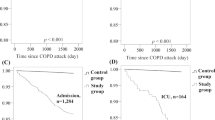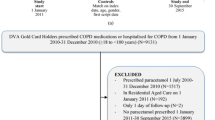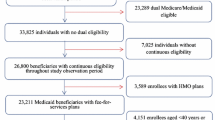Abstract
Background: Cholinesterase inhibitors (ChEIs) are a mainstay treatment for individuals with dementia. ChEIs may worsen airflow obstruction because of their pro-cholinergic properties.
Objective: The objective of this study was to evaluate the risk of serious pulmonary complications in the elderly with concomitant chronic obstructive pulmonary disease (COPD) and dementia who were receiving ChEIs.
Methods: This was a population-based, cohort study conducted between 2003 and 2010 in residents of Ontario, Canada. Subjects were over the age of 66 years and had concomitant dementia and COPD, identified using linked administrative databases. Exposure to ChEIs was determined using a drug benefits database. The primary outcome was an emergency room (ER) visit or hospitalization for COPD. The risk difference at 60 days and the relative risk (RR) for study outcomes were estimated in the propensity score-matched sample.
Results: Of 266 840 individuals with COPD, 45 503 had a concomitant diagnosis of dementia. A total of 7166 unexposed subjects were matched to subjects newly exposed to ChEIs. New users of ChEIs were not at significantly higher risk of ER visits or hospitalizations for COPD (RR 0.90; 95% CI 0.76, 1.07) or COPD exacerbations (RR 1.02; 95% CI 0.91,1.15). Furthermore, ER visits for any respiratory diagnoses were not increased among new users of ChEIs (RR 1.02; 95% CI 0.87, 1.19) when compared with non-users. Subgroup analyses were consistent with the main analysis.
Conclusions: In a large cohort of elderly individuals with COPD and dementia, new users of ChEIs had a similar risk for adverse pulmonary outcomes as those who were not receiving ChEIs.





Similar content being viewed by others
References
Ballard C, Gauthier S, Corbett A, et al. Alzheimer’s disease. Lancet 2011; 377(9770): 1019–31
Hogan D, Bailey P, Black S, et al. Diagnosis and treatment of dementia: 5. Nonpharmacologic and pharmacologic therapy for mild to moderate dementia. CMAJ 2008; 179(10): 1019–26
Gill SS, Bronskill SE, Mamdani M, et al. Representation of patients with dementia in clinical trials of donepezil. Can J Clin Pharmacol 2004; 11(2): e274–85
Mitchell SL, Teno JM, Kiely DK, et al. The clinical course of advanced dementia. N Engl J Med 2009 Oct 15; 361(16): 1529–38
Rochon PA, Berger PB, Gordon M. The evolution of clinical trials: inclusion and representation. CMAJ 1998 Dec 1; 159(11): 1373–4
Birks J. Cholinesterase inhibitors for Alzheimer’s disease. Cochrane Database Syst Rev 2006; (1): CD005593
Thacker EL, Schneeweiss S. Initiation of acetylcholinesterase inhibitors and complications of chronic airways disorders in elderly patients. Drug Saf 2006; 29(11): 1077–85
Gershon AS, Wang C, Guan J, et al. Identifying individuals with physician diagnosed COPD in health administrative databases. COPD 2009 Oct; 6(5): 388–94
Levy AR, O’Brien BJ, Sellors C, et al. Coding accuracy of administrative drug claims in the Ontario Drug Benefit database. Can J Clin Pharmacol 2003; 10(2): 67–71
Gill SS, Bronskill SE, Normand SL, et al. Antipsychotic drug use and mortality in older adults with dementia. Ann Intern Med 2007 Jun 5; 146(11): 775–86
Gill SS, Anderson GM, Fischer HD, et al. Syncope and its consequences in patients with dementia receiving Cholinesterase inhibitors: a population-based cohort study. Arch Intern Med 2009 May 11; 169(9): 867–73
Rochon PA, Normand SL, Gomes T, et al. Antipsychotic therapy and short-term serious events in older adults with dementia. Arch Intern Med 2008; 168(10): 1090–6
Austin P. Statistical criteria for selecting the optimal number of untreated subjects matched to each treated subject when using many-to-one matching on the propensity score. Am J Epidemiol 2010; 172(9): 1092–7
Rosenbaum P, Rubin D. Constructing a control group using multivariate matched sampling methods that incorporate the propensity score. Am Stat 1985; 39(1): 33–8
D’Agostino R. Propensity score methods for bias reduction in the comparison of a treatment to a non-randomized control group. Stat Med 1998; 17(19): 2265–81
Stukel T, Fisher E, Wennberg D, et al. Analysis of observation studies in the presence of treatment selection bias: effects of invasive cardiac management on AMI survival using propensity score and instrumental variable methods. JAMA 2007; 297(3): 278–85
Austin P, Grootendorst P, Anderson G. A comparison of the ability of different propensity score models to balance measured variables between treated and untreated subjects: a Monte Carlo study. Stat Med 2007; 26(4): 734–53
Deyo RA, Cherkin DC, Ciol MA. Adapting a clinical comorbidity index for use with ICD-9-CM administrative databases. J Clin Epidemiol 1992; 45(6): 613–9
Austin P. Balance diagnostics for comparing the distribution of baseline covariates between treatment groups in propensity-score matched samples. Stat Med 2009; 28(25): 3083–107
Mamdani M, Sykora K, Li P, et al. Reader’s guide to critical appraisal of cohort studies: 2. Assessing potential for confounding. BMJ 2005 Apr 23; 330(7497): 960–2
Austin P. Optimal caliper widths for propensity-score matching when estimating differences in means and differences in proportions in observational studies. Pharm Stat 2011; 10(2): 150–61
Akazawa M, Stearns SC, Biddle AK. Assessing treatment effects of inhaled corticosteroids on medical expenses and exacerbations among COPD patients: longitudinal analysis of managed care claims. Health Serv Res 2008; 43(6): 2164–82
Burge S, Wedzicha J. COPD exacerbations: definitions and classifications. Eur Respir J 2003; 41 Suppl.: 46s–53s
Donaldson GC, Hurst JR, Smith CJ, et al. Increased risk of myocardial infarction and stroke following exacerbation of COPD. Chest 2010; 137(5): 1091–7
Gruneir A, Anderson GM, Rochon PA, et al. Transitions in long-term care and potential implications for quality reporting in Ontario, Canada. J Am Med Dir Assoc 2010 Nov; 11(9): 629–35
Gruneir A, Bell CM, Bronskill SE, et al. Frequency and pattern of emergency department visits by long-term care residents: a population-based study. J Am Geriatr Soc 2010 Mar; 58(3): 510–7
Austin P. Comparing paired vs non-paired statistical methods of analyses when making inferences about absolute risk reductions in propensity-score matched samples. Stat Med 2011; 30(11): 1292
Austin P, Laupacis A. A tutorial on methods to estimating clinically and policy-meaningful measures of treatment effects in prospective observational studies: a review. Int J Biostat 2011; 7(1): Article 6
Shepherd G, Klein-Schwartz W, Edwards R. Donepezil overdose: a tenfold dosing error. Ann Pharmacother 1999; 33(7): 812–5
Greene Y, Noviasky J, Tariot P. Donepezil overdose. J Clin Psych 1999; 60(1): 56–7
Liggett SB, Daughaday CC, Senior RM. Ipratropium in patients with COPD receiving Cholinesterase inhibitors. Chest 1988 Jul; 94(1): 210–2
Acknowledgements
Funding: This study was funded by Team Grant (OTG-88591) from the Canadian Institutes of Health Research (CIHR) and by an Interdisciplinary Capacity Enhancement Grant (HOA-80075) from the CIHR Institute of Gender and Health and the CIHR Institute of Aging. The study was conducted using data held at the Institute for Clinical Evaluative Sciences (ICES), which is funded by an annual grant from the Ontario Ministry of Health and Long-Term Care (MOHLTC). Drs Gruneir and Gershon were funded by an Ontario MOHLTC Career Scientist Award. Dr Bell is supported by CIHR and Canadian Patient Safety Institute Chair in Patient Safety and Continuity of Care funding. Dr Seitz is supported by a Clinician Scientist Development Program award from Queen’s University. Dr Stephenson is supported by a CIHR post-doctoral fellowship award. Dr Gill is supported by a CIHR New Investigator Award.
Role of the funding source: The study sponsor did not participate in the design and conduct of the study; the collection, management, analysis and interpretation of the data; the preparation, review or approval of the manuscript; or the decision to submit the paper for publication. The opinions, results and conclusions reported in this article are those of the authors and are independent from the funding sources. No endorsement by ICES or the Ontario MOHLTC is intended or should be inferred.
Conflicts of interest: The authors have no conflicts of interest that are directly relevant to the content of this article.
Author contributions: Dr Stephenson had full access to all of the data in the study and takes responsibility for the integrity of the data and the accuracy of the data analysis, and had final responsibility for the decision to submit for publication.
Study concept and design: A. Stephenson, S.S. Gill, G.M. Anderson, C.M. Bell, P.A. Rochon and A. Gruneir.
Acquisition of data: A. Stephenson, L. Fu, P.A. Rochon and G.M. Anderson.
Analysis and interpretation of data: A. Stephenson, S.S. Gill, C.M. Bell, A. Gruneir, H.D. Fischer, D.P. Seitz, A.S. Gershon, G.M. Anderson, P.A. Rochon and P.C. Austin.
Drafting of the manuscript: A. Stephenson, S.S. Gill, D.P. Seitz, A. Gruneir, P.A. Rochon and C.M. Bell.
Critical revision of the manuscript for important intellectual content: A. Stephenson, S.S. Gill, C.M. Bell, A. Gruneir, A.S. Gershon, H.D. Fischer, D.P. Seitz and P.A. Rochon.
Statistical analysis: A. Stephenson, P.C. Austin and L. Fu.
Obtained funding: G.M. Anderson and P.A. Rochon.
Study supervision: S.S. Gill and P.A. Rochon.
Author information
Authors and Affiliations
Corresponding author
Rights and permissions
About this article
Cite this article
Stephenson, A., Seitz, D.P., Fischer, H.D. et al. Cholinesterase Inhibitors and Adverse Pulmonary Events in Older People with Chronic Obstructive Pulmonary Disease and Concomitant Dementia. Drugs Aging 29, 213–223 (2012). https://doi.org/10.2165/11599480-000000000-00000
Published:
Issue Date:
DOI: https://doi.org/10.2165/11599480-000000000-00000




